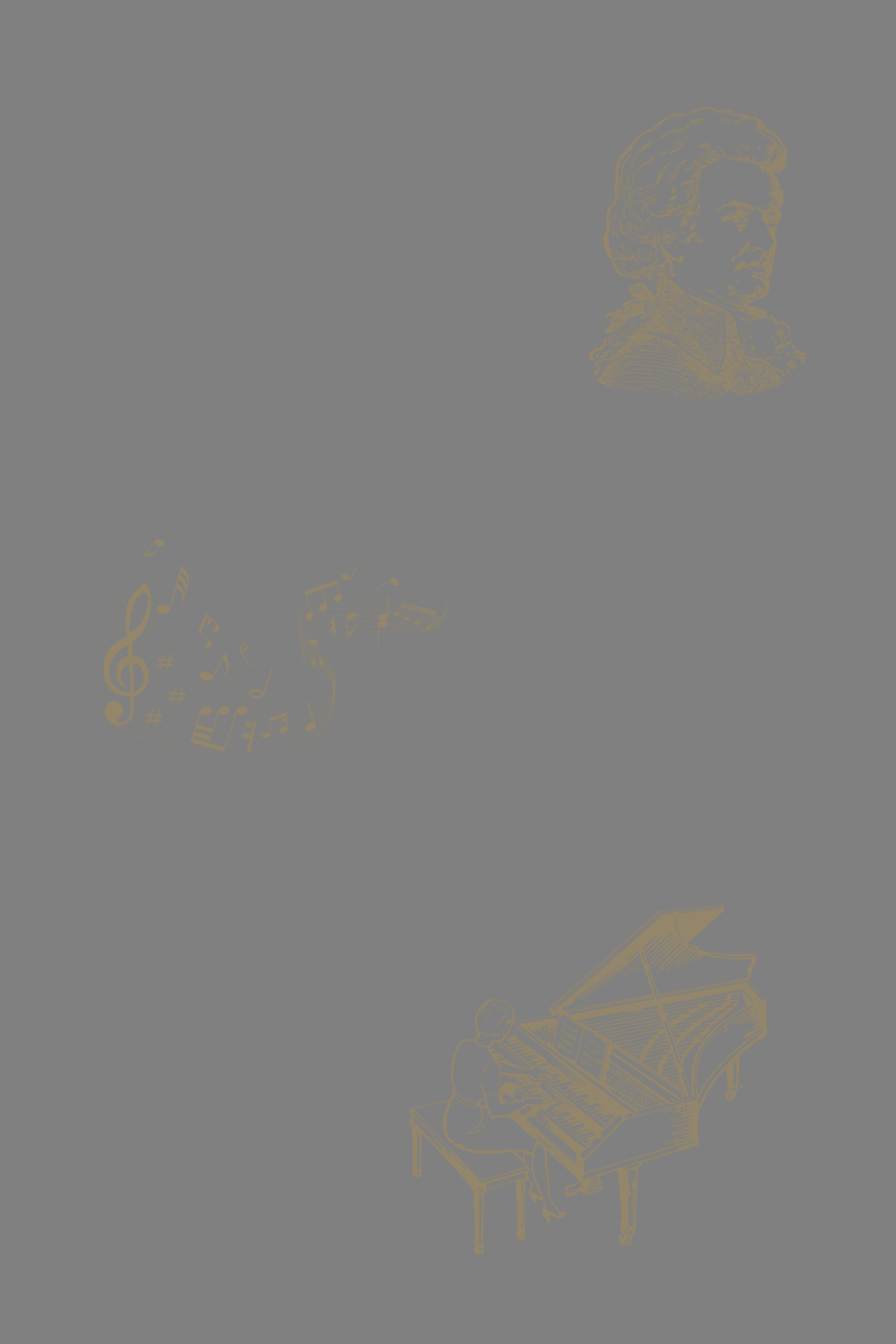
Mozart - A short biography
1756 Wolfgang Amadeus Mozart is born on January 27 in Salzburg. He is the seventh child of Anna Maria (née Pertl 1720-1778) from St. Gilgen and Leopold Mozart (1719-1787) from Augsburg. Five of their children die, only Wolfgang and his older sister Maria Anna (1751-1829), called Nannerl, survive.
1759 Father Mozart creates a first music notebook for his daughter.
1761 Mozart composes his first works. Since he cannot write yet, the proud father documents them in Nannerl’s music notebook.
1762 First journey to the Elector in Munich, followed
by several months in Vienna. There the children play for Empresss Maria Theresa. The time of travelling which then starts amount to a third of Mozart’s life.
1763-1766 The father shows his children to the world. The Great West-European Tour lasts three and a half years and takes the family through Germany and the Austrian Netherlands to France, where they play for Louis XV and his court. Their journey continues across the Channel to England and King George III. There Wolfgang composes his first Symphony, K. 16. On their way back they travel through the Netherlands, France and Switzerland. Wherever they play, the audiences – no matter whether mighty figures or simple people – react with utmost enthusiasm.
1767-1768 Presentation of Mozart’s Apollo et Hyacinthus as an interlude to Latin school drama in Salzburg. Journey to Vienna, Brno and Olomouc (in today’s Czech Republic).
1769-1771 Appointment of the 13-year-old Mozart to the (unsalaried) position of 3rd concert- master of the Salzburg Court Chapel. First Italian journey of father and son to Milan with numerous excursions to other towns. Commission to compose his first Milanese opera Mitridate, Re di Ponto. Admission to the Accademia Filarmonica di Bologna (Padre Martini) and awarding of the Order of the Golden Spur in Rome by the Pope. Second journey to Italy. Second opera commission for Milan, Ascanio in Alba.
1772-1775 Mozart becomes salaried concertmaster of the Salzburg Court Chapel. Third journey to Milan, 3rd opera commission for Lucio Silla. The preparations for the opera La finta giardiniera take Wolfgang and Leopold to Munich in December 1774-March 1775.
1777-1778 Sixteen-month travel to Paris, where Wolfgang’s mother dies. On his way to Paris, Mozart falls in love with Aloysia Weber in Mannheim. There he writes particularly touching works under the influence of the Mannheim school.
1779 Wolfgang wants to marry Aloysia: however, she consents to wed the actor Joseph Lange. Mozart returns to Salzburg, where he is appointed court and cathedral organist.
1781 Premiere of Idomeneo in Munich. Mozart is called to Vienna by the Archbishop Colloredo of Salzburg. Mozart no longer wants to work for him and is released from service “with a kick in the ass”. Mozart stays in Vienna and earns his living through piano lessons and concerts.
1782 Premiere of the singspiel The Abduction from the Seraglio; Mozart marries Constanze Weber, Aloysia’s sister.
1783 Last stay of Wolfgang (together with Constanze) in Salzburg. Mozart’s first son Raimund Leopold lives only two months. On the way back to Vienna, he writes the "Linz" Symphony
"at breakneck speed". Premiere of the C minor Mass K. 427.
1784-1785 Mozart starts to keep a catalogue of all his works; he becomes father again
(Carl Thomas dies in 1858 in Milan). Admission to the Masonic Lodge Zur Wohltätigkeit (Benevolence).
1786 Premiere of The Marriage of Figaro in Vienna.
1787 Mozart in Prague; premiere of Don Giovanni. His father dies in Salzburg.
1788-1789 Mozart has financial difficulties but composes among other works the piano Concerto in D major K. 537 ("Coronation"), the "Jupiter" Symphony and after his return from Berlin (April-June 1789) the Clarinet Quintet.
1790 Premiere of Cosi fan tutte in Vienna. Journey at his own expense to the coronation of Emperor Leopold II in Frankfurt am Main.
1791 Premieres of La clemenza di Tito in Prague and the Magic Flute in Vienna; his son Franz Xaver Wolfgang is born (dies in 1844 in Karlsbad). Constanze is treated at the spa of Baden bei Wien; Mozart begins to write the Requiem, is taken ill and dies on December 5, at I o’clock in the morning at the age of 35 years in Vienna. He is laid out in Saint Stephen’s Cathedral, and his remains are buried in the cemetery of St. Marx.
